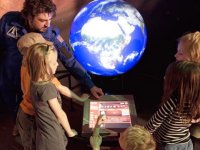Looking for STEM Beyond the Classroom (and Beyond the Field Trip)
For many teachers, new and experienced alike, a mention of "museum" (or aquarium or science center, etc.) in the same sentence as "school" leads to thoughts of field trips. That's not necessarily bad. The field trip certainly has great potential to support student understanding, as well as foster interest and excitement in science, technology, engineering and mathematics, a.k.a. STEM. (Although I am looking at this through STEM-focused glasses, many of the ideas described here would also hold for historical, cultural and art institutions.) And a growing research base points to a variety of outcomes that can be supported with specific strategies related to field trips.
Ending the Isolation
But there are two problems. First, because of tightened purse strings and fears related to test scores, field trips are off-limits in many schools. Secondly, teachers are often unaware that institutions external to schools (like museums or zoos, often referred to as "informal learning institutions") provide much more than field trips to support K-12 student learning, such as outreach programs, where experts visit schools and provide unique objects and materials that teachers can't acquire on their own. Lesson plans, web-based resources and even professional development series are also available, often free (yes, free!), all geared toward bringing the expertise of these informal learning institutions to the teacher, and into the classroom. Unfortunately, many institutions external to schools really struggle to spread the word to local teachers.
My prior work as a high school science teacher has helped me understand how easy it is to isolate yourself within the walls of the classroom, striving for ways to help kids understand and see relevance in the subject while balancing the details of sequencing, grading, testing and, of course, student discipline. As a former museum educator, I've observed the challenges related to connecting with teachers and schools and, with limited funding, creating meaningful learning resources -- such as workshops, web-based activities and outreach programs -- that may ultimately go unused.
Connecting Future Teachers with Informal Learning Institutions
Enough about challenges. Let's move on to how we might create more fruitful interactions between these two groups of dedicated educators. A simple approach that we've used in a few different ways at California State University Long Beach is exposure -- getting teacher candidates and instructors into the community so they can see for themselves what is available. Some of my recent investigations in this area point to word-of-mouth as being the most likely way that teachers will learn about these opportunities. What better way to get the buzz started than first-hand experiences?
As part of their science methods class, my pre-service elementary teachers are required to participate in at least two science-related events or activities at local institutions -- a public lecture at the aquarium, a family star-watching evening, a nature hike, etc. -- followed by a prompted reflection of their experience. To make things even easier, a listing of local events and field trip options are provided to the teachers so they can choose events that fit their interests and schedules (without spending hours trying to dig up the information). A recent evaluation of this assignment showed a significant change in the way that these future teachers thought about informal learning institutions by the end of the course. Rather than "just field trips," they were more likely to see these as "resources" for their classroom as well as opportunities for improving their science knowledge.
We’ve also had success hosting onsite professional development programs in informal settings. Museums were an integral part of a recent training project that engaged urban elementary teachers in science knowledge and pedagogy. The informal learning institutions became a place where concepts were contextualized and authentic experiences could support understanding. For instance, exhibits at a local science center were used to elicit prior knowledge and questions related to wind, waves and erosion. Later in this earth science unit, educators from the science center conducted mini-workshops (similar to what they provide local teachers) that further developed key science concepts. After several rounds of this professional development project that used three informal science institutions over three years, a new core of teachers emerged that began using these community science institutions to support what they did in the classroom. Students and teachers were now exploring science in the community together -- something that simply did not happen before.
Change is Hard
Changing perceptions and then behaviors is not easy. And given the fast-approaching Next Generation Science Standards, there may be a little too much change on the horizon for nervous elementary teachers who haven't been able to teach much science in recent years. But this transition is the best time for teachers to rethink their ideas about informal science institutions. The expertise and resources of the local science center, zoo or aquarium can provide the support that teachers need to confidently embrace reform. Perhaps we will begin to think of teaching science as something that many people do in many different ways with many different resources -- whether inside the classroom or out.
